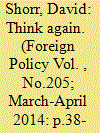|
|
|
Sort Order |
|
|
|
Items / Page
|
|
|
|
|
|
|
| Srl | Item |
| 1 |
ID:
077375


|
|
|
| 2 |
ID:
117984


|
|
|
|
|
| Publication |
2013.
|
| Summary/Abstract |
In today's interconnected world, the United States needs partners to help bolster the global economy, prevent the spread of nuclear weapons, stem climate change, alleviate poverty, and destroy terrorist networks. U.S. peace and prosperity very often hinge on getting other countries to step up. This has led the Obama administration to pursue a strategy-call it the "responsibility doctrine"-of prodding other influential nations (especially the pivotal BRICS countries of Brazil, Russia, India, China, and South Africa) to help shoulder the burden of fostering a stable, peaceful world order that delivers security and prosperity.1 With a more concerted and systematic push than widely recognized, the Obama administration has sought contributions from other nations to help address an extensive range of global challenges. Through incentives, cajoling, and coercion, it has made the pursuit of American-led collective action a hallmark of its foreign policy.
|
|
|
|
|
|
|
|
|
|
|
|
|
|
|
|
| 3 |
ID:
129231


|
|
|
|
|
| Publication |
2014.
|
| Summary/Abstract |
An Ironclad Treaty Is the Only Way to Save the Planet. Don't count on it. Time is running short for the international community to tackle climate change. Pressure to act comes from rising temperatures and sea levels, superstorms, brutal droughts, and diminishing food crops. It also comes from fears that these problems are going to get worse. Modern economies have already boosted the concentration of carbon dioxide (CO2) in the atmosphere by 40 percent since the Industrial Revolution. If the world stays on its current course, CO2 levels could double by century's end, potentially raising global temperatures several more degrees. (The last time the planet's CO2 levels were so high was 15 million years ago, when temperatures were 5 to 10 degrees Fahrenheit higher than they are today.) Another source of pressure, however, is self-imposed. Under the auspices of the United Nations, the next global climate treaty -- to be negotiated among some 200 countries, with the central goal of cutting greenhouse gas emissions -- should be enacted in 2015, to replace the now-outmoded 1997 Kyoto Protocol. (Once passed by state parties, the new treaty would actually go into effect in 2020.)
|
|
|
|
|
|
|
|
|
|
|
|
|
|
|
|
| 4 |
ID:
099594


|
|
|
|
|
|
|
|